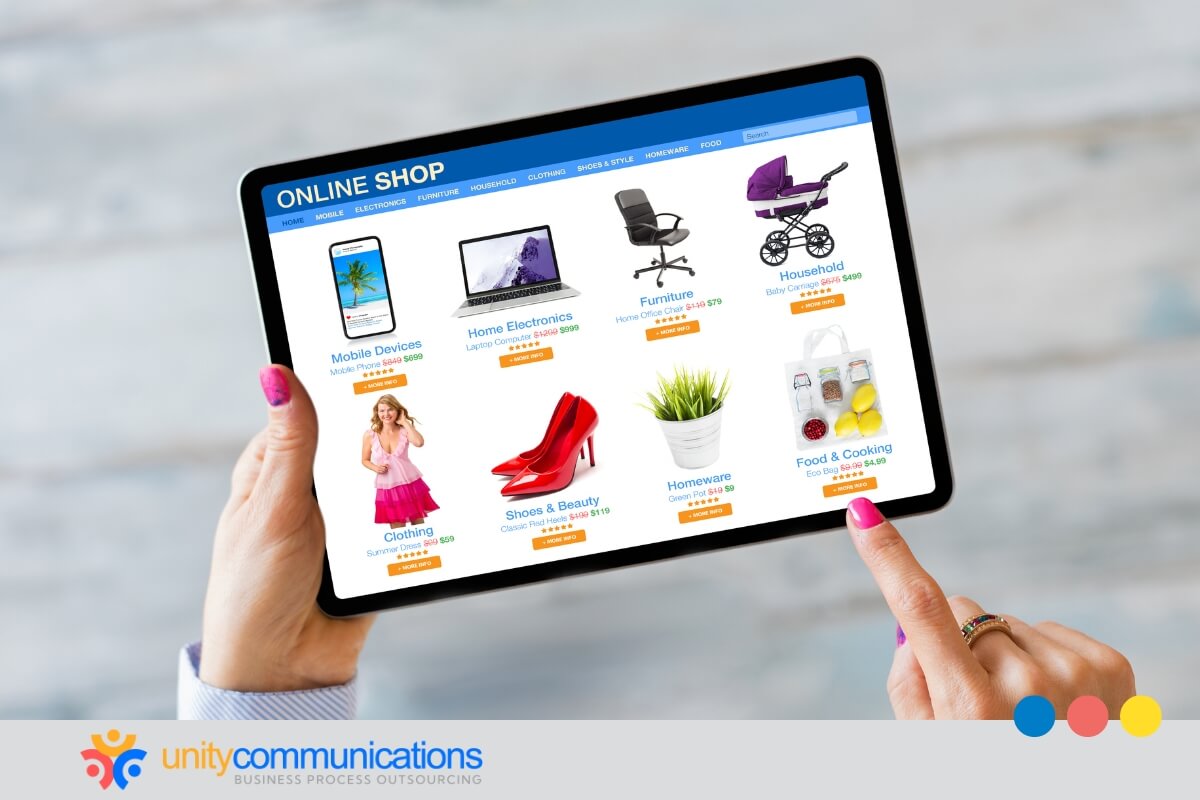Table of Contents
Catalog management is the backbone of e-commerce shops. It helps attract customers, drive sales, and build a stellar brand reputation. However, internal constraints could hinder businesses from achieving these benefits.
Thus, many choose to partner with an outsourcing company or call center for e-commerce. It offers benefits that can optimize and streamline product organization processes.
If you want to learn more about outsourcing e-commerce catalog management, this article is for you. It explores the strategy’s benefits and steps to ensure a successful outsourcing initiative. Keep reading to learn the importance of catalog management and the challenges of in-house operations.
What is e-commerce catalog management?

E-commerce catalog management is critical for an online store. It involves a complex process of sorting, maintaining, and updating product information. This process bridges the gap between products and buyers, influencing shopping experiences and conversion rates. It ensures your shop has accurate and engaging product information to help customers find what they want.
Proper catalog management also gives businesses a competitive edge by increasing consumer satisfaction, making it a key element in e-commerce customer service. To better understand how catalog management helps achieve these goals, let us first answer the question: What is e-commerce customer service?
E-commerce customer service involves assisting online buyers throughout their journey, from product discovery to purchasing to additional post-sales support. Together with catalog management, this process lets your e-commerce business enjoy the following perks:
- Improved customer experience
- Increased customer satisfaction
- Better sales and conversions
- Boosted efficiency
- Enhanced competitiveness
However, keeping your products organized is not enough. So, what exactly makes e-commerce catalog management effective? Let us discuss each factor in detail.
Scope and elements of successful e-commerce catalog management
Successful catalogs revolve around several factors that create a seamless and impactful customer journey. Keeping them in order requires meticulous skills and systems, so many online shops outsource e-commerce catalog management.
Effective catalog management includes the following processes:
- Product data management. This task mainly involves updating your online shop’s product information, such as dimensions, materials, and shipping details. It also includes introducing new offers, discontinuing out-of-stock items, or managing product lifecycles. Accuracy is critical, as consumers rely heavily on these details throughout their journey.
- Media management. Shopify reports that online stores with excellent media enjoy a 94% higher conversion rate. To gain more traction, create high-quality, visually appealing product images. Photograph items from different angles and during use, then enhance and optimize the images to increase customer engagement.
- Content creation. A compelling copy that accurately conveys product features, benefits, and uses also sparks customer interest. It must capture the item’s essence and remain consistent with your brand voice. Researching and inserting relevant keywords and attributes is essential for better search engine optimization (SEO) and discoverability.
- Categorization and taxonomy. Keeping your online shop’s catalog organized logically into categories and subcategories is vital. It must have adequate tags and a well-defined hierarchy to give buyers an easy browsing and shopping experience. However, this task may be daunting. Thus, many outsource e-commerce catalog management.
- Channel management. Remember to maintain consistent product information across all platforms your e-commerce business sells on. From sizes and color variations to rates and inventory levels, consistent and straightforward details help reduce customer complaints and churn.
Other elements critical to catalog management involve inventory and data analysis work. These tasks include:
- Data governance. This task entails establishing frameworks and processes to ensure data accuracy, consistency, and compliance throughout the product information cycle. Delegated staff are responsible for implementing automated or manual reviews, assigning ownership of data elements, and limiting access to product knowledge bases.
- Performance analysis. Businesses must regularly check the effectiveness of their content to identify areas for improvement and strong points. This step saves and reoptimizes resources. Outsourcing gives your e-commerce shop access to tools to analyze catalog management performance.
How does outsourced catalog management help e-commerce shops?
Business process outsourcing (BPO) for catalog management has many advantages for online retailers. It helps them reduce costs, access expertise, leverage tools, increase scalability, and focus on core competencies. Due to these benefits, the global outsourcing market was valued at $280.6 billion in 2023 and will grow by 9.4% by 2030.
This process involves offloading non-core, standard business functions to an external party. Below, let’s explore how catalog management outsourcing can help your online business.
1. Increased cost savings
Significant cost reductions are the most prominent advantage of outsourcing. This benefit is most evident when partnering with a provider in an area with lower living expenses and wage ranges.
The resulting cost differential enables cost savings. For example, according to Outsource Accelerator, businesses that outsource to the Philippines report cutting labor expenses by 70%–90%.
Aside from lower rates, most BPO companies cover various expenses related to hiring and training. They are also responsible for their teams’ benefits, including:
- Health insurance
- Paid time off
- Paid overtime
- Retirement plans
- Government contributions
Outsourcing e-commerce catalog management can also help your business minimize overhead. The practice typically involves working with virtual assistants and leveraging technology, which means you can save on office rent, utilities, and supplies.
2. Improved access to specialized talent
BPO providers access a global talent pool of professionals well-versed in e-commerce trends and best practices. Nearshore and offshore options also provide affordable call center services for your e-commerce catalog management needs.
Outsourcing teams have a specific blend of proficiencies and qualifications that enable them to perform catalog management to a high standard. They undergo rigorous screening and training to ensure they have technical, analytical, interpersonal, and organizational skills, including:
- Product information management (PIM) system expertise
- Data management and analysis
- Content management
- Copywriting and search engine optimization (SEO)
- Web development knowledge
- Critical thinking and problem-solving
- Research and information gathering
- Teamwork and adaptability
Outsourcing teams are also well-versed in federal and state laws regulating e-commerce catalog management. The Fair Trade Commission (FTC) Act is one such law. This code prohibits deceptive and unfair trade practices, such as false advertising and misleading product information.
Third-party professionals also know platform-specific rules for online marketplaces such as Amazon, eBay, and Etsy. They are also experts in industry-specific regulations for food, toys, cosmetics, medical devices, and other regulated products.
3. Ensured leverage of catalog management tools
Digital transformation is one of the leading BPO trends and predictions. Partnering with an e-commerce outsourcing provider allows access to its technologies. Leveraging this technology helps you save on costly investments, loans, and subscriptions.
Here are some tools and software you can use through e-commerce catalog management outsourcing:
- PIM systems. This technology is a single data source for all product information, allowing centralized creation, storage, and management. It automates data cleansing, enrichment, and normalization, ensuring consistency and accuracy across your catalogs. This feature makes it easy to publish synchronized information across all platforms.
- Content management systems (CMS). Outsourcing providers may use a CMS platform for e-commerce catalog management. It helps build and update visually appealing product pages with rich content. CMS tools can also help optimize catalogs with relevant keywords and metadata based on SEO best practices for better search engine visibility.
- Image optimization tools. Product photos must have a specific resolution for SEO purposes. Experts recommend web media be less than 70 KB. BPO providers have the necessary software to resize, crop, and compress images for faster loading times, improved web performance, and better organic reach.
- Artificial intelligence (AI). This technology automates routine tasks, such as data extraction and entry, enhancing efficiency. A study from the National Bureau of Economic Research shows that generative AI increases productivity by an average of 14%. AI also provides personalized product recommendations and catalogs for each customer.
- Extract, transform, and load (ETL) tools. This technology streamlines data gathering, refinement, and integration. It allows you to retrieve product information from various sources, such as platforms, websites, or marketplaces. It also cleans and standardizes data and transfers it to a target, typically a PIM system.
4. Boosted operational scalability and flexibility
The tools and teams you gain through outsourcing enable you to accommodate volume fluctuations without incurring additional costs. Outsourcing lets your e-commerce shop scale its catalog management operations up or down as needed.
You no longer have to worry about overstaffing and understaffing, as BPO workers can be deployed and reassigned as needed. Such conditions reduce the need for internal staff to cover tasks outside their expertise and work longer hours.
Additionally, BPO providers’ global talent pool and tools empower you to offer multilingual services and operate around the clock. These features are vital to providing a positive customer experience, leading to better sales and profitability.
5. Enhanced focus on core activities
E-commerce businesses can reallocate the resources and finances saved through outsourcing to activities that directly affect customer satisfaction and growth. Typical core competencies in e-commerce include:
- Product development
- Market research
- Digital marketing
- Logistics and fulfillment
- Market expansion
- Customer service
Focusing your expertise and assets on what you do best can help you make more effective decisions. It also empowers you to solve problems creatively and deliver stellar results while reducing errors and waste.
Why should you outsource e-commerce catalog management?

The main reason to consider outsourcing for your e-commerce shop is that catalog management can be challenging if you aren’t sure where to start. Time and resource constraints, task complexity and scale, and consistency and accuracy issues might hinder you from effectively operating in-house.
Resource and time constraints
Due to tight labor markets and high compensation costs, qualified talent may be difficult and expensive to access. You might need your employees to work additional hours to perform catalog management, risking stress and burnout.
In addition, leveraging the necessary tools for catalog management may be costly for startups and small to medium-sized businesses (SMBs). These constraints can negatively impact your e-commerce shop and reduce customer satisfaction through:
- Delayed updates
- Reduced quality
- Missed opportunities
Task complexity and scale
Compared to traditional cataloging, e-commerce catalog management is more complex as it involves diverse tasks beyond simple data entry. Your internal team might not be able to maintain accurate and engaging catalogs, lacking the following skills:
- Data entry
- Editing
- Image editing
- Programming
- Copywriting
Without proper resources, your internal team might become overwhelmed by surging workloads as your business grows. Outsourcing helps your e-commerce shop accommodate the impact of scaling catalog management operations, such as:
- Growing product list
- Multiple platforms
- Globalization
Consistency and accuracy issues
Maintaining correct and synchronized product information across various channels requires keen attention to detail and robust processes. The lack of necessary resources can lead to issues, as these processes are time-consuming and error-prone.
These conditions increase customer churn and complaints, decrease sales, and potentially lead to legal issues. Outsourcing can help you overcome these challenges without breaking the bank by leveraging specialized expertise and technologies.
How can you ensure a successful outsourcing integration?
Partnering with a BPO provider is not enough. You must choose the best call center for e-commerce for your business needs. Below is a deep dive into the essential steps of outsourcing.
1. Define your goals and needs
The first step to an effective outsourcing partnership is determining what you want to achieve through catalog management outsourcing. Do you want to improve data accuracy, reduce time spent on catalog tasks, tap into specialized skills, or scale your operations more efficiently?
You must also identify challenges in your current catalog management process. Are there any specific tasks that are draining your resources? Some common pain points include:
- Data accuracy and consistency
- Time constraints
- Lack of expertise
- Technology limitations
Specifying your catalog management objectives and needs allows you to assess your internal capabilities. It helps you make more informed decisions about what processes to outsource and what qualities to look for in a BPO provider.
2. Thoroughly research BPO providers
Signing a contract with the first e-commerce outsourcing firm is not ideal. Gathering as many candidates as possible and comparing them based on criteria is best. Some factors to consider include:
- Experience and portfolio. Read about your prospects’ past partnerships and journeys. A proven track record shows their understanding and capabilities.
- Expertise and specializations. Look for a BPO provider that specializes in e-commerce. Assess its skills in catalog management.
- Service inclusions and rates. Carefully evaluate prospects’ service offerings against your specific requirements. Compare rates to ensure you get the best deal.
- Client reviews and testimonials. Get first-hand feedback from providers’ previous and current clients to better understand what it is like to work with them.
- Security and compliance. Verify your candidates’ security protocols and compliance with relevant industry regulations to avoid costly issues in the future.
3. Create a comprehensive service-level agreement (SLA)
When you have chosen a BPO partner, work closely to draft a contract that protects your best interests. Learning how to write an SLA is critical in outsourcing partnerships.
Make sure to include key performance indicators (KPIs) and communication and collaboration strategies. Remember to specify clear grounds for termination to minimize uncertainties and safeguard against financial losses.
4. Facilitate BPO and product training
Familiarize outsourcing teams with your e-commerce shop’s brand values, mission, and overall culture. Train them in specific catalog management processes and requirements, such as:
- Data structure
- Product categories
- Naming conventions
- Image formatting
- Product knowledge and updates
This step helps ensure the partner aligns with your goals. It empowers them to build knowledge and skills to manage your e-commerce catalog, leading to seamless success.
5. Regularly monitor outsourced processes
Consistent checks and feedback help detect errors, inconsistencies, and performance bottlenecks early on. It enables you to communicate areas for improvement with your BPO provider, building trust.
Sharing monitoring data with your team keeps everyone informed, aligned with goals, and empowered to collectively identify and address potential issues. Additionally, recognizing outstanding work leads to a collaborative and productive partnership.
The Bottom Line

Outsourcing catalog management is becoming an increasingly attractive option for e-commerce businesses. It offers many advantages, from reduced costs to increased scalability and a focus on core activities. Ultimately, it can help you optimize operations and increase customer satisfaction, allowing you to stay ahead of the competition.
Let’s connect if you need an outsourcing provider to help with your e-commerce store’s catalog management processes.




